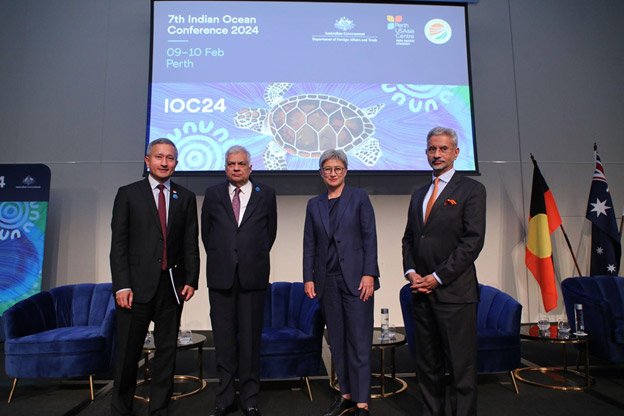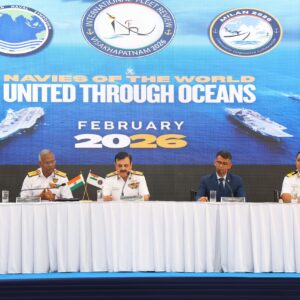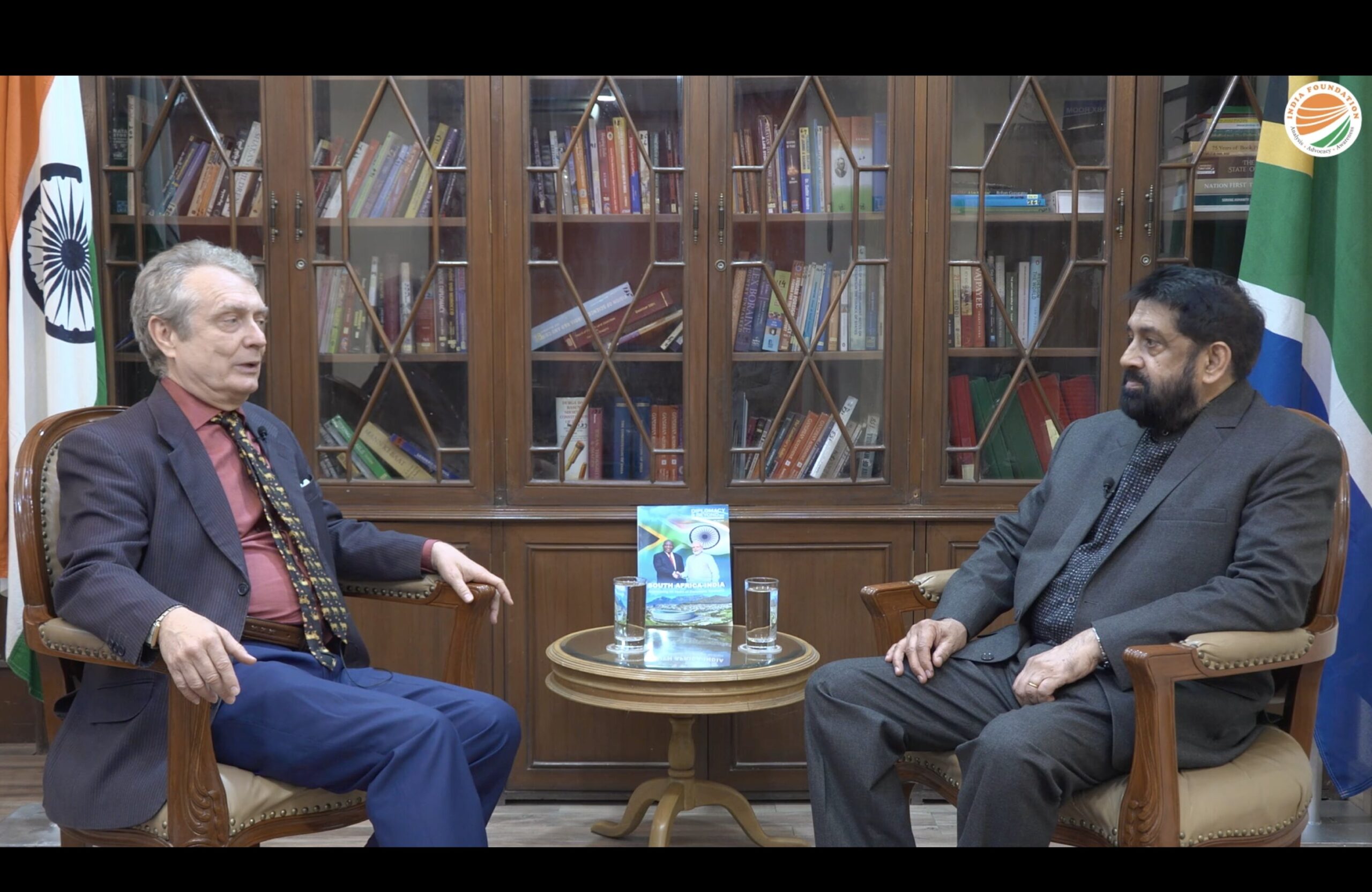The 7th Indian Ocean Conference – IOC 2024 was hosted by India Foundation in association with the Ministry of External Affairs of India ; Department of Foreign Affairs and Trade, Government of Australia; Perth USAsia Centre of Australia and S. Rajaratnam School of International Studies of Singapore on February 9-10, 2024 in Perth, Australia. The theme for this edition of the conference was “Towards a Stable and Sustainable Indian Ocean”.
Over a span of two days, the Conference was addressed by Ministers from 16 countries, including one Head of State, Officials from 16 countries and 6 multilateral organisations. The delegates from over 40 countries attended the Conference.
Day 1 – February 9, 2024
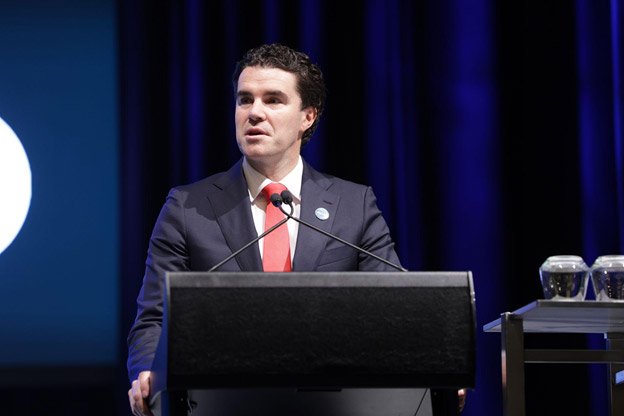
The 7th Indian Ocean Conference – IOC 2024 commenced with the Opening Address by Mr Tim Watts, Assistant Minister of Foreign Affairs, Australia. He expressed his gratitude to India Foundation and Perth USAsia Centre for being partners in organising this Conference. He spoke about the similarities that India and Australia hold with respect to their geographical locations and emphasised on strengthening the Indian Ocean region with respect to maintaining transparency; adhering to rules and regulations and maintaining meaningful lines of communication to deepen the strategic resilience of the countries in the region.
Pre-Conference Thematic Sessions
Panel 1: Climate Change and the Energy Transition
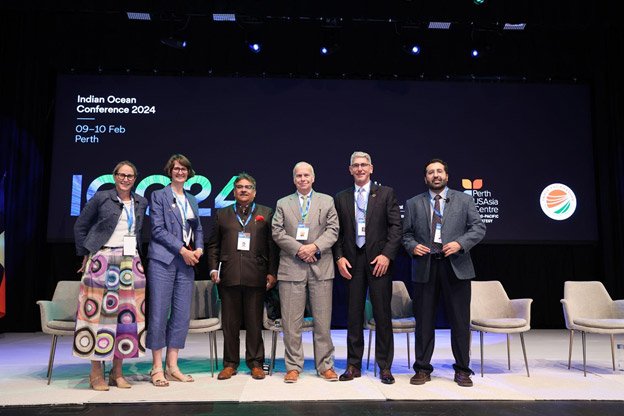
The first panel of the Pre-Conference Thematic Session was under the theme: “Climate Change and the Energy Transition”. Panel 1 was moderated by Kristin Tilley, Ambassador for Climate Change, Australia. The speakers of the panel included Anil Trigunayat, Former Ambassador, India; Phil Midland, President, IHS International LLC, USA; Tony Worby, CEO Flourishing Oceans, Minderoo Foundation, Australia; Abdulla Isa Al-Abbasi, Director, Energy and Environment Program, Studies and Research Directorate, Bahrain Center for Strategic, International and Energy Studies (DERASAT), Bahrain and Kate O’Shaughnessy, Research Director, Perth USAsia Centre, Australia. The panel discussed the issue of the role of Indian Ocean countries to address the challenges of climate change in the region.
Panel 2: Blue Economy
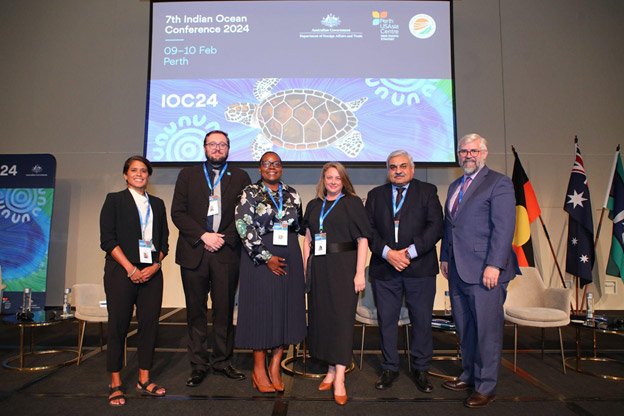
The second panel of the Pre-Conference Thematic Session was under the theme: “Blue Economy”. Panel 2 was moderated by Gordon Flake, CEO, Perth USAsia Centre, Australia. The speakers of the panel included Anil Wadhwa, Former Ambassador, India; Angela Williamson, Director, Blue Policy and Planning, Blue Economy Cooperative Research Centre, Australia; Marie-May Jeremie, CEO, Seychelles Conservation and Adaptation Trust, Seychelles; Timothy Walker, Maritime Project Leader and Senior Researcher, Institute for Security Studies, South Africa and Asha de Vos, Founder, Oceanswell, Sri Lanka. The panel discussed the participation of the Indian Ocean countries in ensuring their responsibility to nurture the blue economy in a sustainable manner.
Panel 3: Managing Global Commons

The third panel of the Pre-Conference Thematic Session was under the theme: “Managing Global Commons”. Panel 3 was moderated by Sujan Chinoy, Director General, Manohar Parrikar Institute for Defence Studies and Analyses, India. The speakers of the panel included Sinderpal Singh, Senior Fellow, RSIS, Singapore; Frederic Grare, Senior Researcher, National Security College, Australian National University, France; Jacqueline Espenilla, Director, The University of the Philippines’ Institute for Maritime Affairs and Law of the Sea, Philippines; Manmohan Parkash, Former Senior Advisor, Office of President, Asian Development Bank, India and Russell Reichelt, Australian Sherpa High Level Panel for a Sustainable Ocean Economy, Australia. The panel discussed the role of Indian Ocean countries to collaborate and work together to manage and share the resources in the Indian Ocean region.
Panel 4: Partnerships for a Resilient Region
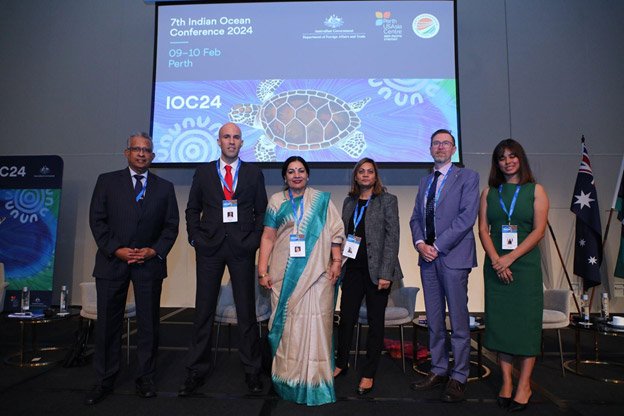
The fourth panel of the Pre-Conference Thematic Session was under the theme: “Partnerships for a Resilient Region”. Panel 4 was moderated by Sunaina Singh, Member, Board of Trustees, India Foundation, India. The speakers of the panel included David Santoro, President, Pacific Forum, USA; Rory Medcalf, Head of National Security College, Australian National University, Australia; Darshana Baruah, Fellow, Carnegie Endowment for International Peace, India; Roukaya Kasenally, Associate Professor, Media and Political Systems, University of Mauritius, Mauritius and Prasad Kariyawasam, Former Foreign Secretary, Sri Lanka. The panel discussed the role of the countries in the Indian Ocean region to collaborate for the region’s sustainable development and a resilient future for all.
Inaugural Session
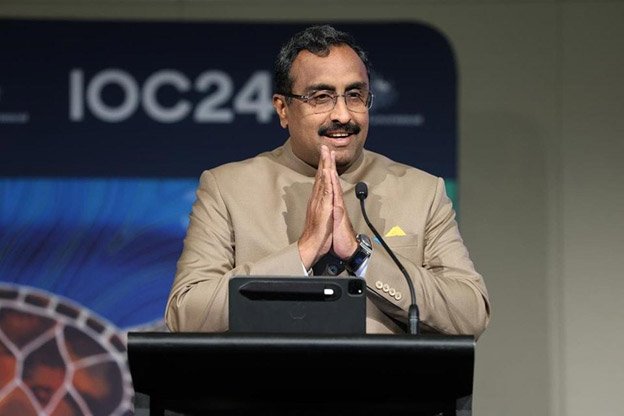
The Inaugural Session of the 7th Indian Ocean Conference commenced with the Curtain Raiser Address by Dr Ram Madhav, President, India Foundation. In his address, Dr Madhav spoke about the Indian Ocean not being “an artificial geo-political construct” but a natural region and home to around 40 nations and more of a “civilisation than a mere maritime geography”. He focused on the “non-traditional” challenges the countries of the Indian Ocean region face like climate change, natural disasters, ocean levels and supply chains over the traditional security issues that sustain all over the world and thus, the Indian Ocean Conference providing the platform to create a forum for deliberation on these challenges and to work out the measures to tackle them.
Dr Madhav expressed his gratitude to Senator Penny Wong, Minister of Foreign Affairs, Australia, for taking the initiative to host the 7th Indian Ocean Conference in Perth, Australia and for joining hands with the Indian Ocean region countries and outgrowing its “Pacific Ocean centric identity”. He also thanked H.E. Ranil Wickremesinghe, President, Sri Lanka; Dr S Jaishankar, External Affairs Minister, India; Dr Vivian Balakrishnan, Minister for Foreign Affairs, Singapore and Sayyid Badr Al-Busaidi, Foreign Minister, Oman for being associated with the series of Indian Ocean Conference since its inception.
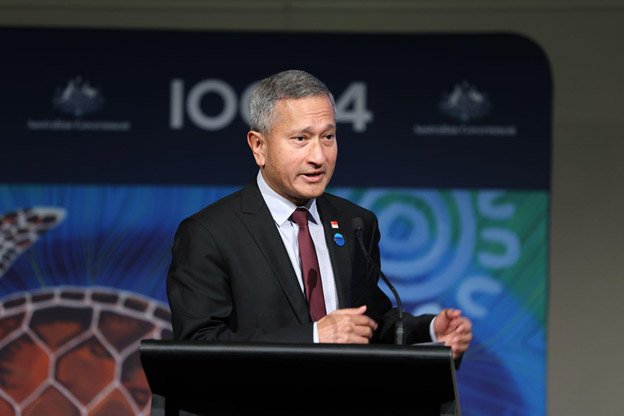
Dr Vivian Balakrishnan, Minister for Foreign Affairs, Singapore, delivered his remarks on the strategic and historical significance of the Indian Ocean, being the “conduit of culture, language, religion and trade”. He spoke about the “choke points” in the Indian Ocean, first of which lies with Singapore and its connectivity with the rest of the world through the Strait of Malacca; secondly, the strategic and economic significance of the Indian Ocean for trade and maritime shipping. Dr Balakrishnan also spoke about the benefits of freedom of navigation and the importance maritime shipping holds for Singapore. Speaking about dangers of coral bleaching, he raised concerns for the sustainable use of marine biodiversity. He also spoke for seeking partnerships for collaborations on “green shipping corridors” to contribute to develop standards, best practices and the technology for decarbonisation, digitalisation, and sustainable growth of the maritime industry.
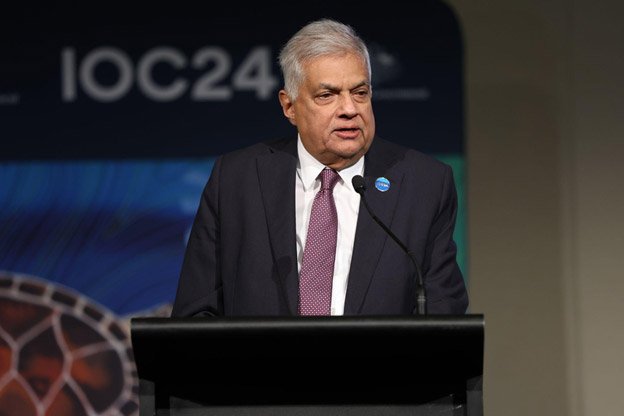
H.E Ranil Wickremesinghe, President, Sri Lanka, highlighted the importance and critical need of enhanced connectivity structure in the Indian Ocean region. He emphasised on the need for a collective geopolitical construct in the region to avoid “contested visions and multiple interpretations”. He also spoke about developments in the western Indian Ocean particularly due to geopolitical shifts and influence of major powers like Russia, China and Iran. The President also spoke of the present day challenges such as recent attacks on commercial vessels by Yemen-based Houthi rebels, and threats of piracy that tends to endanger the idea of freedom of navigation. He also emphasised on the issue of climate crisis, focusing on the Indian Ocean’s vulnerability due to Global Warming, and rising sea levels. He proposed for unity among Indian Ocean Rim countries to address shared challenges and look forward to collective actions and solutions for a more sustainable ocean environment.
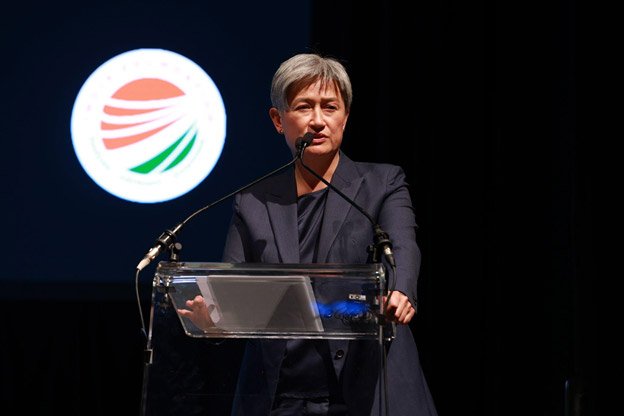
Ms Penny Wong, Minister for Foreign Affairs, Australia, delivered the first keynote address at of the evening. She mentioned Perth as the Indian Ocean capital and the relevance Australia holds in engaging with diverse communities from South and East Asia. She acknowledged the unprecedented threats that have been affecting the prosperity, peace and resilience of the Indian Ocean region leading to depravity of food and energy resources along with rising levels of tensions, conflicts and transnational crime and terrorism. She also raised concern towards ocean warming, acidification, and coral bleaching and called for preservation of the oceanic ecosystem by working collectively towards slowing down the destruction caused by climate change. The Minister also announced the launch of Marine and Coastal Resilience Hub under India’s Indo-Pacific Oceans Initiative. Ms Wong emphasised on building an Indian Ocean community and working towards collective cooperation and collaboration and embracing the regional diversity as strength in building partnerships among nations.
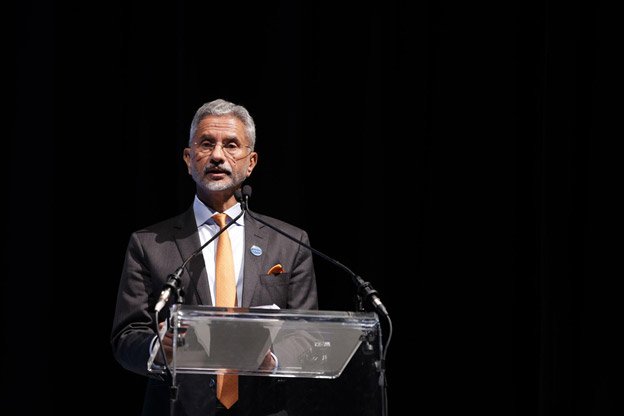
Dr S Jaishankar, External Affairs Minister, India, delivered the second keynote address of the 7th Indian Ocean Conference. He spoke about the issues of maritime traffic, piracy, terrorism and the challenges to international law along with concerns about freedom of navigation and safeguarding of sovereignty and independence of the countries in the Indian Ocean region. He raised concerns about the “grey areas” of various kinds that include climate change, natural disasters and the complexities of dual-purpose agendas that have created anxieties for the stakeholders. Dr Jaishankar emphasised upon the problems of the rise of inherent globalisation which has created supply-side risks and the possibilities of leveraging and thus the need to disperse production amongst more geographies and build “reliable and resilient supply-chains”. He spoke about the importance of the Indian Ocean Rim Association (IORA) and BIMSTEC in the region, the development and consolidation of the Quad grouping and emphasised the significance of India-Australia ties for the regional and global good.
Day 2 – February 10, 2024
Fireside Chat
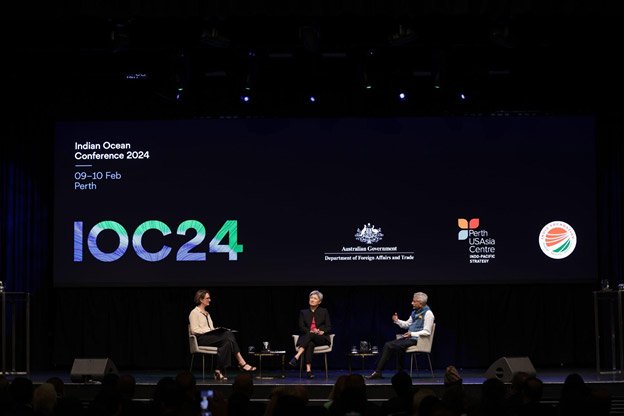
The second day of the Conference started with a fireside chat between Ms Penny Wong, Minister for Foreign Affairs, Australia and Dr S Jaishankar, External Affairs Minister, India. They spoke about the significance of India-Australia bilateral relations and their development in present times which is reflected in the betterment of the region and the complementary relationship the two countries share thus bringing two different perspectives towards a common ground. The ministers spoke about the equation both the countries have with other Indian Ocean countries and how it elevates the regional engagements. They also spoke about the development of regional architecture in the Indian Ocean and the role of Quad in subsequent developments.
Plenary Session 1
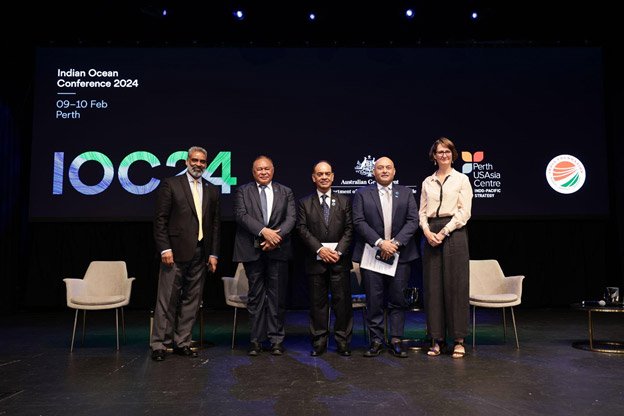
The first Plenary Session of Day 2 of the Conference was hosted by Kate O’Shaughnessy, Research Director, Perth USAsia Centre, Australia. The speakers of the panel included Maneesh GOBIN, Minister of Foreign Affairs, Regional Integration and International Trade, Mauritius; Bendito dos Santos Freitas, Minister of Foreign Affairs and Cooperation, Timor Leste; Muhammad Faruk Khan, Minister for Civil Aviation and Tourism, Bangladesh and Richard Verma, Deputy Secretary of State for Management & Resources, USA. The ministers spoke about the role of Indian Ocean countries to contribute and cooperate on their shared interests to secure a peaceful and prosperous region for the future generations.
Plenary Session 2
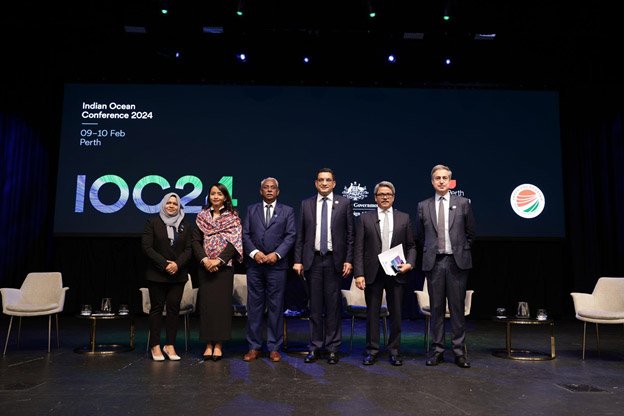
The second plenary session of the Conference was moderated by Md Shahriar Alam, Member of Parliament and Former Minister of State for Foreign Affairs, Bangladesh. The speakers of the panel were Rafaravavitafika Rasata, Minister of Foreign Affairs, Madagascar; M.U.M. Ali Sabry PC, MP, Minister of Foreign Affairs, Sri Lanka; Errol Fonseka, Minister of Internal Affairs, Seychelles; Sheryna Abdul Samad, Minister of State for Foreign Affairs, Maldives and Marc Abensour, Ambassador for the Indo-Pacific, France. The speakers of the session discussed various issues in the Indian Ocean region and the significance of the island states in the region to safeguard the well-being of the shared ocean resources.
Plenary Session 3
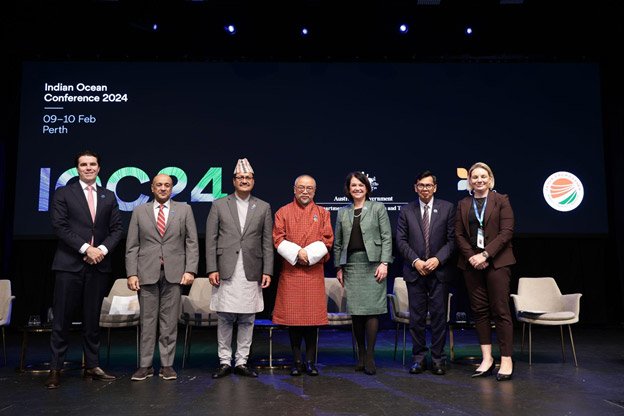
The third plenary session was chaired by Jennifer Parker, Expert Associate, National Security College, Australian National University. The speakers of the panel included Tim Watts, Assistant Foreign Minister, Australia; Jasem Mohamed AlBudaiwi, Secretary General, GCC; Narayan Prakash Saud, Minister for Foreign Affairs, Nepal; Dasho Chhewang Rinzin, Advisor, Ministry of Foreign Affairs and External Trade, Bhutan; Eileen Laubacher, Special Assistant to the President and Senior Director for South Asia, National Security Council (NSC), USA and Yayan Ganda Hayat Mulyana, Head, Indonesia’s Foreign Policy Strategy Agency, Indonesia. The panellists deliberated on the role of new technologies and innovations which could benefit the Indian Ocean region.
Plenary Session 4
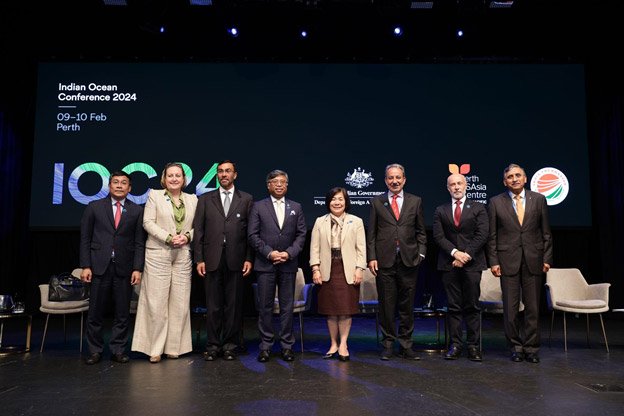
The fourth plenary session was moderated by Arun Sahni, Member, Governing Council, India Foundation and Former GOC-in-C, South Western Command, India. The panellists of the session were Anne-Marie Trevelyan MP, Minister of State (Indo-Pacific), UK; Nguyen Minh Vu, Vice Minister of Foreign Affairs, Vietnam; Ahmed Ali Al Sayegh, Minister of State for Foreign Affairs, UAE; Golam Sarwar, Secretary General, SAARC; Busadee Santipitaks, Deputy Permanent Secretary, Thailand; Shaikh Abdulaziz Al Hinai, Ambassador at Large, Ministry of Foreign Affairs, Oman and Gabriele Visentin, Ambassador of EU to Australia, EU. The ministers and officials in the session discussed the collective prosperity, sustainability and connectivity in the Indian Ocean region and how the Indian Ocean countries can ensure a safe and secure future of the region.
Plenary Session 5
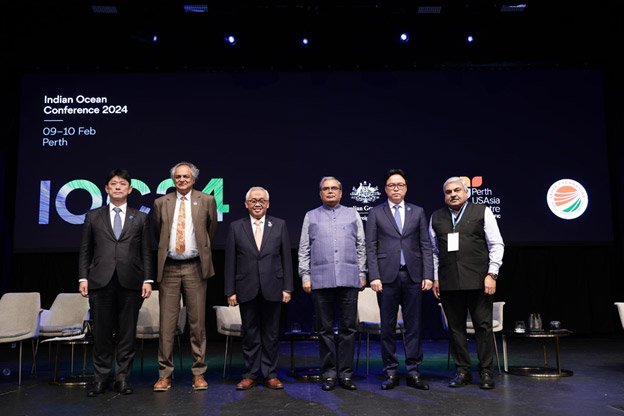
The fifth plenary session was chaired by Anil Wadhwa, Former Ambassador, India. The speakers of the session included Masahiro Komura, Parliamentary Vice Minister for Foreign Affairs, Japan; Velayoudom Marimoutou, Secretary General, Indian Ocean Commission; Salman Al Farisi, Secretary General, IORA; Indra Mani Pandey, Secretary General, BIMSTEC and Prak Nguon Hong, Secretary of State, Ministry of Foreign Affairs and International Cooperation, Cambodia. The speakers in the session spoke on facilitating collective action and cooperation, especially through regional architecture amongst the Indian Ocean countries.
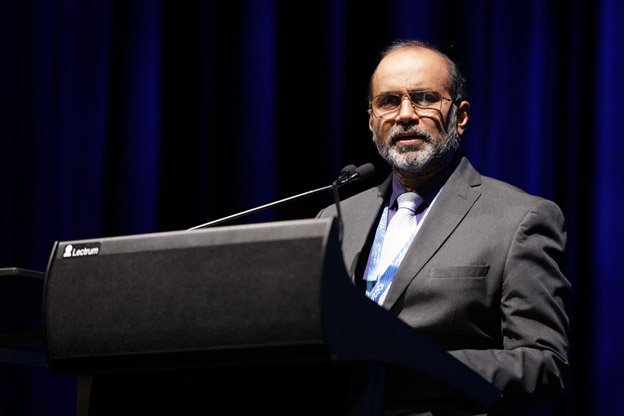
The 2-day 7th Indian Ocean Conference concluded with the Vote of Thanks by Capt Alok Bansal, Director, India Foundation.


